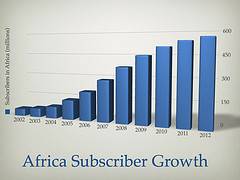Contrary to popular belief, Africa is not completely absent from the Internet. In fact, the continent at large is undergoing a connectivity revolution unlike anything it has ever seen. Mobile phones in particular are propagating at an incredible rate, with penetration ranging from 30% to 100%. The average is 30.4% and there are 280 million subscribers in total, making Africa the fastest growing mobile market in the world.

The point of this series is to highlight African contributions to social media and, in turn, reveal how social media is changing Africa.
Part One of this series looks at social media contributions from Africans, Part Two looks at mobile and connectivity innovations and Part Three looks at how local Governments, NGOs and nonprofits are being affected. If you like this series of articles, I cover these topics daily at the African social media news blog Appfrica.net, as does Erik Hersman at WhiteAfrican.com and Ismail Dhorat at StartupAfrica.com.
Things aren’t perfect; the continent still suffers from disproportionate amounts of poverty, the vast majority of people remain without reliable electricity and the spread of AIDS claimed about 1.6 million African lives in 2006. Historically, that’s all the world has known about Africa – but the facts are changing and other aspects of the continent deserve attention. For one, Africans are embracing the web and all things associated.
The Web Community in Africa
Technology unconferences and Barcamps have sprung up all over the continent, everywhere from Kenya to Nairobi to Madagascar to Uganda and Senegal. Although terrestrial broadband infrastructure is still a problem, VSat has provided internet connectivity in areas that don’t even have electricity. There were a number of protests from the continent when Twitter shut down it’s international services.
It’s no wonder, then, that a number of companies, investors and entrepreneurs have taken a second look at the continent. Google especially seems to have taken an interest in supporting the burgeoning tech renaissance in Africa. They recently agreed to facilitate Barcamp Africa at their world headquarters at GooglePlex in Mountain View, CA, U.S.A. Beyond that, they’ve launched a blog to document their operations in sub-Saharan Africa and a complimentary forum.
African Social Media Leaders
The three biggest success stories of independent social media projects taking off in Africa are Afrigator (a South African aggregator of African blogs and news), Zoopy (a YouTube/Flickr like service also out of South Africa) and Ushahidi (an SMS crisis reporting and mapping engine from Kenya). All three have drawn international attention which resulted in a major investment for Zoopy and Afrigator’s acquisition (ReadWriteWeb’s coverage). Meanwhile Ushahidi has successfully raised several rounds of funding after winning the Net2 Mashup Compeition prize of $25,000.
Afrigator

Afrigator defines itself as “a social media aggregator and directory built especially for African digital citizens who publish and consume content on the web.” They made a big splash in the social media space when Marshall Kirkpatrick reviewed their site here on ReadWriteWeb last year. Afrigator adopted the XFN microformat standard very early on allowing their users to use their blog rolls to import friends. Afrigator makes heavy use of a proprietary filter based on an algorithm that uses page rank, incoming links and the site’s overall traffic to determine what’s “hot”. Afrigator was created by Justin Hartman, Stii Pretorius, Mike Stopforth and Mark Forrester.
Zoopy.com

Zoopy is a South African social media tool created by Jason Elk that allows users to upload videos, podcasts, and pictures and share them on the web. Although, it can be used by anyone, it targets the niche local market of South Africa. Zoopy also uses XFN to import friends from the aforementioned Afrigator. Zoopy recently attended the Web 2.0 Expo 2008 in New York where they showcased their platform.
Ushahidi

Ushahidi, which means “testimony” in Swahili, was built in the aftermath of the Kenyan 2008 elections. When violence erupted, Erik Hersman, Ory Okolloh, Daudi Were, Segeni Ng’ethe and Juliana Chebet used their collective talents to create Ushahidi, a web app that maps SMS reports of violence by location. Ushahidi relies heavily upon GoogleMaps, which it uses for mapping reports of incidents. It’s built on the Zend framework for PHP and uses a number of different protocols for SMS, GPRS and mapping data.
African Social Application Round-Up
Although these three standout applications are the most well-known home grown social media projects from Africans, there are an increasing number of social media websites coming from the continent. Here’s a round-up of several. If something gets overlooked, please add it as a comment along with a description.
I’ve deliberately only included applications that I know were created by people from Africa. In Part Three I’ll list social applications created by foreigners and nonprofit groups.
- Muti.co.za (a Digg-like South African news site)
- Sokwanele.com (an SMS/mapping application similar to Ushahidi)
- Amatomou (a South African news and social media aggregator)
- BlogSpirit (a Ugandan blog aggregator based on the open source Gregarious)
- Mzalendo (portal for tracking the actions of Kenya’s Parliament)
Top image: whiteafrican










